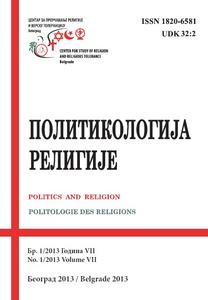 A new issue of Politics and Religion Journal is online. Click here for the table of contents.
A new issue of Politics and Religion Journal is online. Click here for the table of contents.
Publications
11Jul
New issue of Politics and Religion Journal (Vol. 7, No. 1)
10:01 - By Administrator - Publications
05Jul
New Book: Risky Liasons? Democracy and Religion: reflections and case studies.
15:39 - By Administrator - Publications
Risky Liasons? Democracy and Religion: reflections and case studies.

G.J Buijs, J.T. Sunier and P.G.A. Versteeg (eds.) VU University Press, 2013
http://www.vuuitgeverij.com/149-risky-liaisons
In a democracy, there is always the risk of antagonism, conflict and opposition rising to the surface. Most people in the West take these risks for granted and are predisposed to accept the imperfections of the system. Globally, however, democracy is not as self-evident. Actually, its acclaimed universality is highly contested. To what extent is democracy a Western, Eurocentric Project? And to what extent is this form of government compatible with other cultural and value systems?
Ιn this book, the authors address these questions by revealing how democracy is informed by religious values from a variety of traditions. In doing so, they make clear that religion and democracy are not as neatly separated as the secularist point of view would have us believe. They also question the popular opinion that Islam is at odds with democratic government, for example in the analysis of shura, an Islamic form of consultation with the people. Democratic traditions and religious value systems can, therefore, interact and co-exist in more than one way. Any reader who wants to examine these interactions, and the challenges that they pose for contemporary plural society will find this book useful.
With contributions from John Anderson, Ina ter Avest, Edien Bartels, Christoph Baumgartner, Lenie Brouwer, Herman de Dijn, Yaser Ellethy, Mohammed Girma, Matthew Kaemingk, Michiel Leezenberg, Bert Jan Lietaert Peerbolte, Siebren Miedema, Frans van der Velden, and John Witte.
05Jul
New Book: Religion in International Relations Theory
15:34 - By Administrator - Publications
Religion in International Relations Theory. Interactions and Possibilities
By Nukhet Sandal, Jonathan Fox
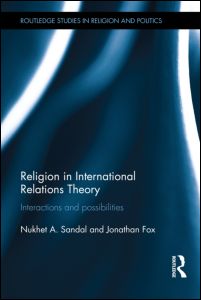
Published 16th May 2013 by Routledge – 228 pages
Series: Routledge Studies in Religion and Politics
There is a growing realization among international relations scholars and practitioners that religion is a critical factor in global politics. The Iranian Revolution, the September 11 attacks, the ethno-religious conflicts such as the ones in the former Yugoslavia and Sri Lanka are among the many reasons for this increased focus on religion in international affairs. The rise of religious political parties across the world ranging from the Christian Democrats in Europe to Bharatiya Janata Party in India similarly illustrated religion's heightened international profile.
Despite all this attention, it is challenging to situate religion within a discipline which has been dominantly secular from its inception. Only a few existent works have ventured to integrate religion into core international relations theories such as Classical Realism, Neorealism, Neoliberalism, Constructivism and the English school. This work is the first systematic attempt to comparatively assess the place of religion in the aforementioned theoretical strands of international relations with contemporary examples from around the world.
Written in an accessible and systematic fashion, this book will be an important addition to the fields of both religion and international relations.
Nukhet A. Sandal is Assistant Professor in the Political Science Department at Ohio University.
Jonathan Fox is Professor in the Department of Political Studies at Bar Ilan University, Israel.
05Jul
Special Issue of Politics and Religion Journal on Contemporary India
15:18 - By Administrator - Publications
Special Issue of Politics and Religion Journal on Politics and Religion in Contemporary India
http://www.politicsandreligionjournal.com/index.php?option=com_content&view=category&layout=blog&id=6&Itemid=3&lang=en
New Issue
Volume VII (No. 1) - Spring 2013.
TABLE OF CONTENTS
The word of guest editor
C.N. Venugopal
Polity, religion and Secularism in India: A Study of Interrelationships
Anantna Kumar Giri
The Politics of Religion and the Complex Spirituality of Religious Encounters and Co - Realizations: The Multiverse of Hindu Engagement with Christianity in India
Paramjit S. Judge
Community within Community: Politics of Exclusion in the Construction of Sikh Identity
Ashish Saxena and Vijaylaxmi Saxena
Religious Landscape, Low Caste Hindus and the Identity Politics: Configuration of Socio - Religious Space for Weaker Sections in Jammu City, J&K (India)
Ajay I Choudhary
Buddhist Identity: A Case Study of Buddhist Women's Narratives in Nagpur City
Ramanuj Ganguly
Social Dynamics in a Religious Milieu: The Sevayats of the Jagannath Temple at Puri
Susan Visvanathan
Sacred rivers: Energy Resources and People's Power
ANALYSES
Jerold Waltman
Church Autonomy, Sexual Orientation, and Employment Policy in Britain: A Legislative History of the Employment Provisions of the Equality Act 2010
Marko Nikolić and Duško Dimitrijević
Macedonian Orthodox Church (MOC) in Former Yugoslav State
REVIEWS, CRITICAL VIEWS AND POLEMICS
Sunčica Mitrović The Problems of Politology of Religion
02May
New Publication: Ethnicities Special Issue on "Public discourses about Muslims and Islam in Europe"
17:23 - By Administrator - Publications
Ethnicities
Special Issue: Public discourses about Muslims and Islam in Europe: A comparative analysis
April 2013; Vol. 13, No. 2
The below Table of Contents is available online at: http://etn.sagepub.com/content/vol13/issue2/?etoc
Guest Editorial Public discourses about Muslims and Islam in Europe Manlio Cinalli and Marco Giugni Ethnicities 2013;13 131-146 http://etn.sagepub.com/cgi/reprint/13/2/131
Articles
Political opportunities, citizenship models and political claim-making over Islam Manlio Cinalli and Marco Giugni Ethnicities 2013;13 147-164 http://etn.sagepub.com/cgi/content/abstract/13/2/147
Dynamics of contestation over Islamic religious rights in Western Europe Sarah Carol and Ruud Koopmans Ethnicities 2013;13 165-190 http://etn.sagepub.com/cgi/content/abstract/13/2/165
Discursive framing and the reproduction of integration in the public sphere: A comparative analysis of France, the United Kingdom, the Netherlands and Germany Maarten Koomen, Jean Tillie, Anja van Heelsum, and Sjef van Stiphout Ethnicities 2013;13 191-208 http://etn.sagepub.com/cgi/content/abstract/13/2/191
The impact of dramatic events on public debate concerning accommodation of Islam inEurope Nathalie Vanparys, Dirk Jacobs, and Corinne Torrekens Ethnicities 2013;13 209-228 http://etn.sagepub.com/cgi/content/abstract/13/2/209
The changing public face of Muslim associations in Britain: Coming together for common ‘social’ goals? Marta Bolognani and Paul Statham Ethnicities 2013;13 229-249 http://etn.sagepub.com/cgi/content/abstract/13/2/229
02May
New Publication: Politics of Minority and Secularims
17:21 - By Administrator - Publications
The Turkish Journal of Politics has recently published a new issue about politics of minority and secularism.
Please find below the topics of interests and join us at http://tjp.fatih.edu.tr/
Turkish Journal of Politics - Winter 2012
Citizens' Perceptions of Left-Right Ideologies in Finland
The Kurdish Question and Social Theorization: The Way to Resolution
Towards a Muslim Secularism? An Islamic `Twin Tolerations' Understanding of Religion in the Public Sphere
Minority Groups: Bridgeheads in Nigerian Politics,1950s – 1964
Challenging the Leviathan? China and the Imperative of Empire in Africa
Transatlantic Security Partnership: The Nixon and Reagan Era
A Shift of Axis in Turkish Foreign Policy or A Marketing Strategy? Turkey's Uses of Its `Uniqueness' vis-à-vis the West/Europe
02May
New Book: Catholics, Conflicts and Choices
17:06 - By Administrator - Publications
Catholics, Conflicts and Choices An Exploration of Power Relations in the Catholic Church
Series: Gender, Theology and Spirituality Author: Angela Coco
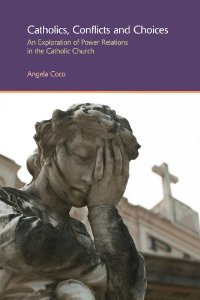
DESCRIPTION: Many Catholics today are disenchanted with the Church’s continuing distrust of women and laity. But, despite this widespread dissatisfaction, traditional power relations have hardly changed over the last century. Catholics, Conflicts and Choices presents detailed interviews with lay people, priests, Sisters, and Christian Brothers, each discussing their personal struggles with church teachings and practices. The conversations are selected to illustrate different experiences of power relations – particularly different aspects of gender dynamics – within the organisational structures of the Church. The interviews are examined within a framework of feminist, sociological and psychological theory. Catholics, Conflicts and Choices reveals how, despite a long history of challenging official notions of authority and obedience and assumptions about intimate relationships, there is little potential for change if the established power relations of the Church are not confronted.
AUTHOR BIO: Angela Coco is Senior Lecturer in Social Sciences at Southern Cross University in Lismore, New South Wales, Australia.
CONTENTS: Part I Experience and Knowledge 1. When this Story Began 2. Growing up Catholic 3. Thinking about Experience 4. Sharing Knowledge Part II Catholic Experiences of Power 5. Questioning the Catholic Institution 6. Engaging with other Catholics 7. Managing One’s Self Part III Gender Work in Christ's Household 8. Catholic Housework 9. A Most Un/natural Order Appendix Bibliography Index
02May
New Book: Islam in the Hinterlands: Muslim Cultural Politics in Canada
16:57 - By Administrator - Publications
Islam in the Hinterlands: Muslim Cultural Politics in Canada
Jasmin Zine - UBC Press, 2012
http://www.ubcpress.ca/search/title_book.asp?BookID=299173665
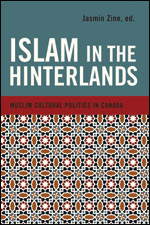
About the Book
Muslim communities have become increasingly salient in the social, cultural, and political landscape in Canada largely due to the aftermath of 9/11 and the racial politics of the ongoing "war on terror" that have cast Muslims as the new "enemy within."
Islam in the Hinterlands features empirical studies and critical essays by some of Canada's top Muslim Studies scholars who examine how gender, public policy, media, and education shape the Muslim experience in Canada. Touching on much-debated issues, such as the shar'ia controversy, veiling in public schools, media portrayals of Muslims, and anti-terrorism legislation, this book takes a distinctly anti-racist, feminist standpoint in exploring the reality of the Muslim diaspora.
A timely collection addressing some of the most hotly contested issues in recent cultural history, Islam in the Hinterlands will be essential reading for academics as well as general readers interested in Islamic studies, multiculturalism, and social justice.
About the Author(s)
Jasmin Zine is an associate professor of sociology and the Muslim Studies Option at Wilfrid Laurier University.
Table of Contents
List of Tables
Acknowledgments
Introduction: Muslim Cultural Politics in the Canadian Hinterlands / Jasmin Zine
Part 1: Gender and Cultural Politics
1 Unsettling the Nation: Gender, Race, and Muslim Cultural Politics in Canada / Jasmin Zine
2 The Great Canadian "Shar'ia" Debate / Itrath Syed
3 Toward a Framework for Investigating Muslim Women and Political Engagement in Canada / Katherine Bullock
Part 2: Media and Representation
4 Colluding Hegemonies: Constructing the Muslim Other Post-9/11 / Yasmin Jiwani
5 Marketing Islamic Reform: Dissidence and Dissonance in a Canadian Context / Meena Sharify-Funk
6 Toward Media Reconstruction of the Muslim Imaginary in Canada: The Case of the Canadian Broadcasting Corporation's Sitcom Little Mosque on the Prairie / Aliaa Dakroury
Part 3: Education
7 From Mosques to Madrassas: Civic Engagement and the Pedagogy of Islamic Schools / Nadeem Memon
8 Unveiled Sentiments: Gendered Islamophobia and Experiences of Veiling among Muslim Girls in a Canadian Islamic School / Jasmin Zine
Part 4: Security
9 The Security Certificate Exception: A Media Analysis of Human Rights and Security Discourses in Canada's Globe and Mail and National Post / Jacqueline Flatt
10 The Anti-terrorism Act and National Security: Safeguarding the Nation against Uncivilized Muslims / Shaista Patel
Contributors
Index
Reviews
"I cannot think of a religious community more in need of study than Canadian Muslims, who have, until now, received scant scholarly attention. This book examines the hybridity of Canadian Islam, and discusses the various ways in which Muslims have, and have not, adapted to their contexts. Timely and cutting-edge, it will be of great interest to students and scholars of religion, sociology, and anthropology, as well as cultural, legal, and gender studies."
Amir Hussain, Editor, Journal of the American Academy of Religion
02May
New Book: The Diaspora of Brazilian Religions
16:54 - By Administrator - Publications
New book:
THE DIASPORA OF BRAZILIAN RELIGIONS Cristina Rocha & Manuel A. Vásquez
http://www.brill.com/diaspora-brazilian-religions
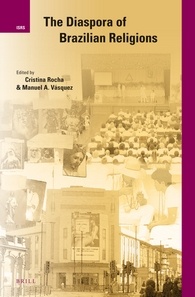
The Diaspora of Brazilian Religions explores the global spread of religions originating in Brazil, a country that has emerged as a major pole of religious innovation and production. Through ethnographically-rich case studies throughout the world, ranging from the Americas (Canada, the U.S., Peru, and Argentina) and Europe (the U.K., Portugal, and the Netherlands) to Asia (Japan) and Oceania (Australia), the book examines the conditions, actors, and media that have made possible the worldwide construction, circulation, and consumption of Brazilian religious identities, practices, and lifestyles, including those connected with indigenized forms of Pentecostalism and Catholicism, African-based religions such as Candomblé and Umbanda, as well as diverse expressions of New Age Spiritism such as the John of God Movement, and Ayahuasca-centered neo-shamanism like Vale do Amanhecer and Santo Daime.
Table of Contents
Introduction: Brazil in the New Global Cartography of Religion Manuel A. Vásquez and Cristina Rocha
SECTION I: BRAZILIAN CHRISTIANITY: CATHOLICISM AND PROTESTANTISM
Ch 1: Edir Macedo's Pastoral Project: A Globally Integrated Pentecostal Network Clara Mafra, Claudia Swatowiski, and Camila Sampaio
Ch 2: Brazilian Churches in London: Transnationalism of the Middle Olivia Sheringham
Ch 3: The 'Devil's Egg': The Football Players as New Missionaries of the Diaspora of Brazilian Religions Carmen Rial
Ch 4: Brazilian Pentecostalism in Peru: Affinities between the Social and Cultural Conditions of Andean Migrants and the Religious Worldview of the Pentecostal Church "God is Love" Dario Paulo Barrera Rivera
Ch 5: Catholicism for Export: The Case of Canção Nova Brenda Carranza and Cecília Mariz
SECTION II: AFRO-BRAZILIAN RELIGIONS
Ch 6: Umbanda and Batuque in the Southern Cone: Transnationalization as cross-border religious flow and as social field Alejandro Frigerio
Ch 7: Pretos Velhos across the Atlantic: Afro-Brazilian Religions in Portugal Clara Saraiva
Ch 8: Transnational Authenticity: An Umbanda Temple in Montreal Deirdre Meintel and Annick Hernandez
Ch 9: Japanese Brazilians among Pretos-Velhos, Caboclos, Buddhist Monks and Samurais: An Ethnographic Study of Umbanda in Japan Ushi Arakaki
Ch 10: Mora Iemanja? Axé in Diasporic Capoeira Regional Neil Stephens and Sara Delamont
SECTION III: NEW RELIGIOUS MOVEMENTS
Ch 11: Building a Transnational Spiritual Community: The John of God Movement in Australia Cristina Rocha
Ch 12: The Valley of Dawn in Atlanta, Georgia: Negotiating Gender Identity and Incorporation in the Diaspora José Cláudio Souza Alves and Manuel A. Vásquez
Ch 13: The Niche Globalization of Projectiology: Cosmology and Internationalization of a Brazilian Parascience Anthony Fischer D'Andrea
Ch 14: Transcultural keys: Humor, Creativity and other Relational Artifacts in the transposition of a Brazilian Ayahuasca Religion to the Netherlands Alberto Groisman
02May
New Book: Topographies of Faith
16:52 - By Administrator - Publications
Topographies of Faith.
Religion in Urban Spaces
Edited by Irene Becci, Marian Burchardt, and José Casanova
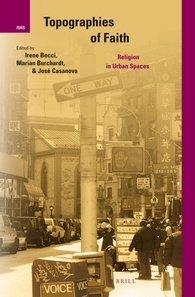
Based on ethnographic explorations in cities across the globe, Topographies of Faith offers a unique and compelling analysis of contemporary religious dynamics in metropolitan centers. While most scholarship on religion still sidelines questions of spatiality and scale, this book creatively draws on perspectives from urban studies to study the spatiality of religion in modern cities. It shows how globalization, transnational migration and urban expansion in big cities engender new religious forms and practices and their spatial underpinnings. Space affects urban religious diversity,religious innovations, decline or vitality. But it also shapes the relationships between religion and social equalities. Spanning distances between New York, Delhi and Johannesburg, the book also engages with issues of secularity and religious vitality in genuinely new ways.
http://www.brill.com/topographies-faith
02May
New book: Gender and Power in Contemporary Spirituality
16:49 - By Administrator - Publications
Gender and Power in Contemporary Spirituality
Ethnographic Approaches
Edited by Anna Fedele and Kim Knibbe
Gender and Power in Contemporary Spirituality
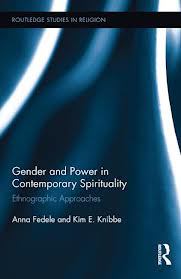
This book contains captivating descriptions of the entanglements of gender and power in spiritual practices and detailed analyses of the strategies spiritual practitioners use to attain what to social scientists might seem an impossible goal: creating spiritual communities without creating gendered hierarchies.
Contemporary spiritual practitioners tend to present their own spirituality as non-hierarchical and gender equal, in contrast to ‘established’ religions. Current studies of these movements often reproduce their selfdescription as empowering, while other literature reacts polemically against these movements, describing them as narcissist and irrelevant and/or in league with capitalism. This book moves between these two poles, recognizing that gender and power are always at work in any socio-cultural situation.
What strategies do people within these networks use to attain gender equality and gendered empowerment? How do they try to protect and develop individual freedom? How do gender and power nevertheless play a role?
The contributions collected in this book demonstrate that in order to understand contemporary spirituality the analytical lenses of gender and power are essential. Furthermore, they show that it is not possible to make a clear distinction between established religions and contemporary spirituality:
the two sometimes overlap, at other times spirituality uses religion to play off against while reproducing some of the underlying interpretative frameworks. While recognizing the reflexivity of spiritual practitioners and the reciprocal relationship between spirituality and disciplines such as anthropology, the authors do not take the discourses of spiritual practitioners for granted. Their ethnographic descriptions of lived spirituality span a wide range of countries, from Portugal, Italy and the Netherlands to Mexico and Israel.
“An important and original contribution to the understanding of the dynamics of gender and power in alternative forms of spirituality.” – Sabina Magliocco, California StateUniversity, Northridge, USA
“Central to spirituality is a desire for personal liberation, we hear again and again. Yet this rich collection of ethnographies demonstrates that it is deeply shaped by performances ofgender and power.” – Dick Houtman, Erasmus University, Netherlands
https://genderandpowerincontemporaryspirituality.wordpress.com/
02May
New Journal: Critical Research on Religion
16:46 - By Administrator - Publications
The first issue of Critical Research on Religion is now available for free on line at:
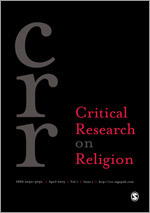
To get this free access, you will first need to register with SAGE at:
https://online.sagepub.com/cgi/register?registration=FTCRR
There is also a CRR Facebook page. Please "Like" the page at:
http://www.facebook.com/CriticalResearchOnReligion
Finally, for extended, ongoing, and archived discussions of articles, please post your comments at:
15Apr
New Book: Between State and Synagogue. The Secularization of Contemporary Israel
11:04 - By Administrator - Publications
Between State and Synagogue The Secularization of Contemporary Israel
Guy Ben-Porat, Ben Gurion University of the Negev, Israel

Paperback
Series: Cambridge Middle East Studies(No. 42)
ISBN:9780521176996 Publication date:March 2013
A thriving, yet small, liberal component in Israeli society has frequently taken issue with the constraints imposed by religious orthodoxy, largely with limited success. However, as this thoughtful new book by Guy Ben-Porat suggests, in recent years, in part because of demographic changes and in part because of the influence of an increasingly consumer-oriented society, dramatic changes have occurred in secularization of significant parts of public and private lives. Even though these fissures often have more to do with lifestyle choices and economics than with political or religious ideology, the demands and choices of a secular public and a burgeoning religious presence in the government are becoming ever more difficult to reconcile. The evidence, which the author has accrued from numerous interviews and a detailed survey, is nowhere more telling than in areas that demand religious sanction such as marriage, burial, the sale of pork, and the operation of businesses on the Sabbath. This book makes an important and timely contribution to the study of contemporary Israeli society, as new alliances are being forged in the political arena.
19Mar
New Series: Religion and Global Migrations
14:15 - By Administrator - Publications
Announcing Palgrave Macmillan’s new series: Religion and Global Migrations
As the first series of its kind, Religion and Global Migrations will examine the phenomenon of religion and migration from multiple disciplinary perspectives (for example, historical, anthropological, sociological, ethical and theological), from various global locations (including the Americas, Europe and Asia), and from a range of religious traditions. The Series Editors are interested in monographs and edited volumes that explore the intersections of religion and migration from a variety of approaches, including studies of:
- Shifting Religious Practices and Ideas in sending and receiving communities, among migrants and also among those who interact with migrants in places of origin and destination;
- Public Responses to migration such as religiously informed debates, policies and activism among migrants and nonmigrants alike;
- Gender Dynamics including shifts in gender roles and access to power in sending and receiving sites;
- Identity in relation to religion and migration that may include constructive, as well as descriptive, scholarship;
- Empire, from the ancient Mediterranean through the height of European colonization to contemporary relationships between the developing and developed world, and the way it has profoundly affected the movement of people and development of religions;
- Other topics connecting to the theme of religion and global migrations.
Series Editors
Elena Fiddian-Qasmiyeh is Departmental Lecturer in Forced Migration at the Refugee Studies Centre, and Junior Research Fellow in Refugees Studies at Lady Margaret Hall elena.fiddian-qasmiyeh@qeh.ox.ac.uk
Jennifer B. Saunders is an independent researcher who has published on transnational Hinduism jbsaund1@yahoo.com
Susanna Snyder is Assistant Professor in Contemporary Society and Christian Ethics at Episcopal Divinity School, Cambridge, MA ssnyder@eds.edu
Editorial Board
Peggy Levitt (Wellesley College, USA) Kim Knott (Lancaster University, UK) Zain Abdullah (Temple University, USA)
Proposals
If you are interested in submitting a proposal to be considered for the series, please contact one of the Series Editors or: Burke Gerstenschlager, Palgrave Macmillan Burke.Gerstenschlager@palgrave-usa.com
01Feb
New Book: Religion and Human Security
09:26 - By Administrator - Publications
Religion and Human Security A Global Perspective Edited by James K. Wellman and Clark B. Lombardi
Since the1950s the world has witnessed a period of extraordinary religious revival in which religious political parties and non-governmental organizations have gained power around the globe. At the same time, the international community has come to focus on the challenge of promoting global human security. This groundbreaking book explores how these trends are interacting. In theoretical essays and case studies from Turkey, Egypt, Pakistan, the Americas, Africa and Europe, the contributors address such crucial questions as: Under what circumstances do religiously motivated actors advance or harm human welfare? Do certain state policies tend to promote security-enhancing behavior among religious groups? The book concludes by providing important suggestions to policymakers about how to factor the influence of religion into their evaluation of a population's human security and into programs designed to improve human security around the globe.
About the Author(s)
James K. Wellman, Jr. is Associate Professor and Chair of the Comparative Religion Program at the Jackson School of International Studies. He is the author of The Gold Church and the Ghetto: Christ and Culture in Mainline Protestantism and Evangelical vs. Liberal: The Clash of Christian Cultures and the editor of several books, including, Belief and Bloodshed: Religion and Violence Across Time and Tradition.
Clark B. Lombardi is Associate Professor of Law and Adjunct Associate Professor of International Relations at the University of Washington. He is the author of State Law as Islamic Law: The Incorporation of the Shari`a into Egyptian Constitutional Law as well as numerous academic articles. He is co-editor of the Oxford Islamic Legal Studies series .
22Jan
New Book: Religion, Rights And Secular Society European Perspectives
18:07 - By Administrator - Publications
Religion, Rights And Secular Society European Perspectives Edited by Peter Cumper, University of Leicester, UK and Tom Lewis, Nottingham Trent University, UK December 2012
[http://www.e-elgar.com/bookentry_main.lasso?id=14080 |http://www.e-elgar.com/bookentry_main.lasso?id=14080]
This topical collection of chapters examines secular society and the legal protection of religion and belief across Europe, both in general and more nation-specific terms.
The expectations of many that religion in modern Europe would be swept away by the powerful current of secularization have not been realised, and today few topics generate more controversy than the complex relationship between religious and secular values. The 'religious/secular' relationship is examined in this book, which brings together scholars from different parts of Europe and beyond to provide insights into the methods by which religion and equivalent beliefs have been, and continue to be, protected in the legal systems and constitutions of European nations. The contributors' chapters reveal that the oft-tumultuous legacy of Europe's relationship with religion still resonates across a continent where legal, political and social contours have been powerfully shaped by faith and religious difference.
Covering recent controversies such as the Islamic headscarf, and the presence of the crucifix in school class-rooms, this book will appeal to academics and students in law, human rights and the social sciences, as well as law and policy makers and NGOs in the field of human rights. Full table of contents
Contents:
1. Introduction Peter Cumper and Tom Lewis
2. The Netherlands: Neutral But Not Indifferent Marjolein van den Brink and Titia Loenen
3. Secularism and Establishment in the United Kingdom Peter W. Edge
4. Law, Religion and Belief in Germany Gerhard Robbers
5. Religion in the Constitutional Order of the Republic of Ireland Eoin Daly
6. Religion and Secular Values in Spain: A Long Path to a Real Religious Pluralism Eugenia Relaño Pastor
7. The Rise and Contradictions of Italy as a Secular State Marco Ventura
8. Religious Freedom in a Secular Society: An Analysis of the French Approach to manifestation of Beliefs in the Public Sphere Sylvie Bacquet
9. Secularism, Law and Religion within the Cypriot Legal Order Achilles C. Emilianides
10. The Pendulum of Church-State Relations in Hungary Renata Uitz
11. Law, Religion and Belief in Slovakia, the Czech Republic and Poland Michaela Moravcíková
12. Human Rights and Religion in the Balkans Julie Mertus
13. Understanding Religion in Europe: A Continually Evolving Mosaic Grace Davie
14. Islam and Secular Values in Europe: From Canon to Chaos? Jørgen S. Nielsen
15. Legal Considerations Concerning New Religious Movements in the 'New Europe' James T. Richardson and Valerie A. Lykes
07Jan
New Book: Whatever Happened to the Islamists?
18:54 - By Administrator - Publications
Whatever Happened to the Islamists?: Salafis, Heavy Metal Muslims, and the Lure of Consumerist Islam Eds. Amel Boubekeur & Olivier Roy Columbia/Hurst, 2012

http://cup.columbia.edu/book/978-0-231-15426-0/whatever-happened-to-the-islamists
Widespread confusion over the use of the terms Islamism or Political Islam often obscures the fact that these are not new phenomena and can be traced back more than a century. But like all utopian beliefs, such as Communism, Islamism cannot entirely resist the broader currents of political and social change that confront it today, especially globalisation. Through meticulous on the ground and theoretical research in to the trajectories of current and former Islamists, the contributors to this book seek to understand what has become of political Islam. While many scholars have focused on the drift to violence of historical Islamism, they look at the other side of the coin to describe the continuities and not the ruptures of Islamism with its own ideology. Political Islam remains relevant to a new generation of militants but the channels through which it is expressed have changed. Jihad is often conducted electronically, via membership of Islamist e-mail list-servers; Islamist activism has been personalised, domesticated even, through the consumption of Islamic soft drinks and other lifestyle choices; and, the street protests that characterised the Islamist struggle in its heyday face competition from Islamic rap stars' concerts. These are among the issues addressed in this innovative volume.
Reviews
Although recent events in the Middle East seem to answer the question posed by this volume's title, news headlines obscure a tectonic shift in Islamism that has occurred over the last couple of decades. Whatever Happened to the Islamists? represents one of the most exciting and innovative analyses of contemporary dislocations in the ideological project of political Islam to be published in recent years. It points the way forward for an entire field of study. (Peter Mandaville, George Mason University and author of Global Political Islam )
Amel Boubekeur and Olivier Roy present a refreshing and provocative collection of essays, including several by younger scholars and others whose writings are rarely available in English. They display the iconoclasm, unanticipated fusions, and the modernity of contemporary Islamic activism, much of which does not see conquest of state power as a central objective. Islamic activism today is manifested in all-women heavy metal bands, consumerism, corporate big business, and individualised consumer and cultural choices. This book deserves to be widely read and debated, especially by journalists, pundits, and public policy makers who may have thought they already knew what Islamism is. (Joel Beinin, Donald J. McLachlan Professor of History, Stanford University )
Whatever Happened to the Islamists? will be welcomed by all who seek to understand the impact of the Arab uprising and the role of Islamists during this historic period of political transformation in the Arab world. (John L. Esposito, University Professor, Georgetown University and author of The Future of Islam ) About the Authors
Amel Boubekeur is a research fellow at the Ecole des Hautes Etudes en Sciences Sociales and the Ecole Normale Supérieure in Paris and a visiting fellow at the Brookings Doha Center. She has been an Associate Scholar at the Carnegie Endowment for International Peace and the Centre for European Policy Studies. Working on Islam in Europe and Arab politics, she is the author of European Islam : Challenges for Public Policy and Society and Le voile de la mariée.
Olivier Roy is a professor at l'Ecole des Hautes Etudes en Sciences Sociales in Paris and a research director at the Centre National de la Recherche Scientifique. A world authority on Islam and politics, Roy's books are Secularism Confronts Islam, The Failure of Political Islam, The New Central Asia: The Creation of Nations, Globalized Islam: The Search for a New Ummah, and, with Mariam Abou Zahab, Islamist Networks: The Afghan-Pakistan Connection.
07Jan
New Issue: Religion and Society In Central and Eastern Europe
12:40 - By Administrator - Publications
VOL 5, NO 1 (2012) of Religion and Society In Central and Eastern Europe is now available at: http://www.rascee.net/index.php/rascee/issue/view/5/showToc
TABLE OF CONTENTS
EDITORIAL
Editorial
ARTICLES
Studying Religion and Power: Conceptual and Methodological Challenges (Pål Repstad)
Religion in Central European Societies: Its Social Role and People’s Expectations (Branko Ančić, Siniša Zrinščak)
What about Our Rights? The State and Minority Religious Communities in Croatia: A Case Study (Ankica Marinović, Dinka Marinović Jerolimov)
Extremist Manipulations of Apocalyptic Fears: A Case Study of de-Christianisation and Islamisation Discourses on the Romanian New Right Blog (Adela Fofiu)
REVIEWS
András Máté-Tóth and Cosima Rughiniş (eds.) Spaces and Borders: Current Research on Religion in Central and Eastern Europe Berlin/Boston: De Gruyter (James T. Richardson)
Gert Pickel and Kornelia Sammet (eds.) Transformations of Religiosity. Religion and Religiosity in Eastern Europe 1989 – 2010 Wiesbaden: Springer VS, 2012. 216 pages. ISBN: 978-3-531-17540-9. € 34.95 (paperback) (Peter Török)
Lavinia Stan and Lucian Turcescu Church, State, and Democracy in Expanding Europe Oxford: Oxford University Press, 2011. 287 pages. ISBN: 978-0-19-533710-5. US$ 65 (hardback) (Monica Grigore)
Milda Ališauskienė and Ingo W. Schröder (eds.) Religious Diversity in Post-Soviet Society. Ethnographies of Catholic Hegemony and the New Pluralism in Lithuania Farnham/Burlington: Ashgate, 2012. 226 pages. ISBN: 978-1-4094-0912-0. £45.00 (hardback) (Smoczynski Rafal)
07Jan
New Book: Religion in the Neoliberal Age
12:33 - By Administrator - Publications
Religion in the Neoliberal Age Political Economy and Modes of Governance Edited by François Gauthier, University of Fribourg, Switzerland and Tuomas Martikainen, University of Helsinki, Finland Ashgate 2013
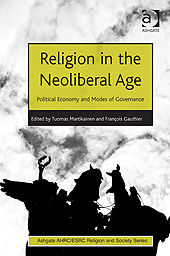
http://www.ashgate.com/isbn/9781409449782
This book, together with the complementary volume Religion in Consumer Society, focuses on religion, neoliberalism and consumer society; offering an overview of an emerging field of research in the study of contemporary religion. Outlining changes in both the political-institutional and cultural spheres, the contributors offer an international overview of developments in different countries and state of the art representation of religion in the new global political economy.
'Tuomas Martikainen and François Gauthier seek to break new ground and work toward a synthesis and clarification of the diverse and often contradictory approaches to understanding the transformation of religion in today's globalized world. The contributors to the volume analyze these changes as integral to the recent economic shaping of culture in the form of consumerism and neoliberalism. They explore the changing landscape of relations between religions and states in the context of the rise of market-oriented, neoliberal modes of governance and management, including as concerns religious organizations.' - Peter Beyer, University of Ottawa, Canada
Contents
Introduction: Religion in Market Society François Gauthier, Tuomas Martikainen and Linda Woodhead
PART I Religions in the New Political Economy
1 Entrepreneurial Spirituality and Ecumenical Alterglobalism: Two Religious Responses to Global Neoliberalism Joanildo A. Burity
2 Making Religion Irrelevant: The 'Resurgent Religion' Narrative and the Critique of Neoliberalism James V. Spickard
3 The Decline of the Parishes and the Rise of City Churches: The German Evangelical Church in the Age of Neoliberalism Jens Schlamelcher
4 Catholic Church Civil Society Activism and the Neoliberal Governmental Project of Migrant Integration in Ireland Breda Gray
5 Faith, Welfare and the Formation of the Modern American Right Jason Hackworth
PART II Political Governance of Religion
6 Neoliberalism and the Privatization of Welfare and Religious Organizations in the United States of America David Ashley and Ryan Sandefer
7 Multilevel and Pluricentric Network Governance of Religion Tuomas Martikainen
8 Regulating Religion in a Neoliberal Context: The Transformation of Estonia Ringo Ringvee
9 Neoliberalism and Counterterrorism Laws: Impact on Australian Muslim Community Organizations Agnes Chong
10 From Implicitly Christian to Neoliberal: The Moral Foundations of Canadian Law Exposed by the Case of Prostitution Rachel Chagnon and François Gauthier
11 Religious Freedom and Neoliberalism: From Harm to Cost-benefit Lori G. Beaman
05Dec
New book: Multiple Modernities and Postsecular Societies
04:03 - By Administrator - Publications
New publication: Multiple Modernities and Postsecular Societies, edited by Massimo Rosati and Kristina Stoeckl. Farnham: Ashgate, 2012.
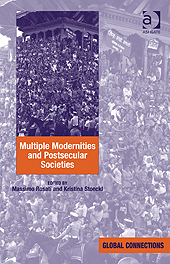
Engaging with the idea that the world reveals not one, but many routes to modernity, this volume explores the role of religion in the emergence of multiple forms of modernity, which evolve according to specific cultural conditions and interpretations of the ‘modern project’. Drawing upon case study material from Africa, The Middle East, Russia and South America, it examines the question of whether modernity, democracy and secularism are universalistic concepts or are, on the contrary, unique to Western civilization, whilst considering the relationship of postsecularism to the varied paths of modern development.
With contributions by Alessandro Ferrara, Ugur Kömecoglu, Massimo Rosati, Chiara Letizia, Enzo Pace, Alexander Agadjanian, Kristina Stoeckl and Peter Wagner.
« previous entries - page 3 of 4 - next entries »